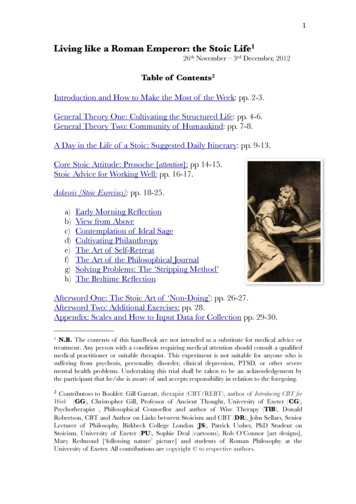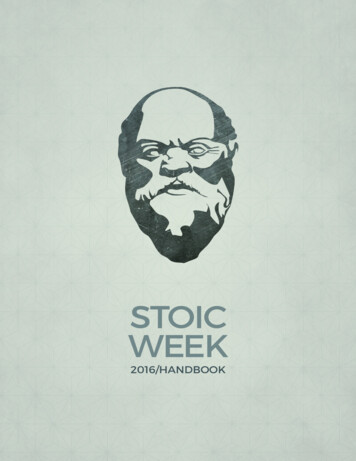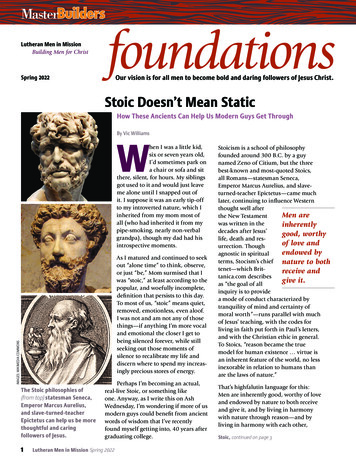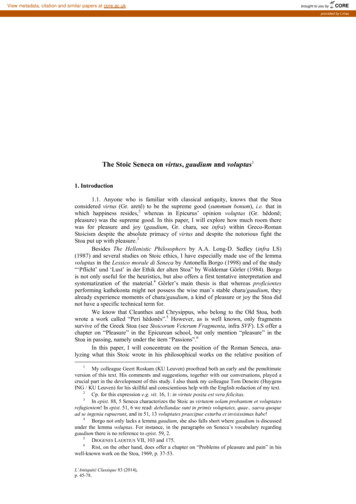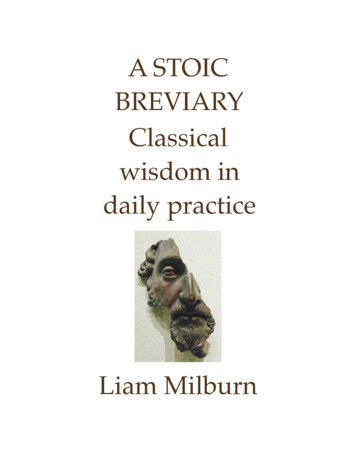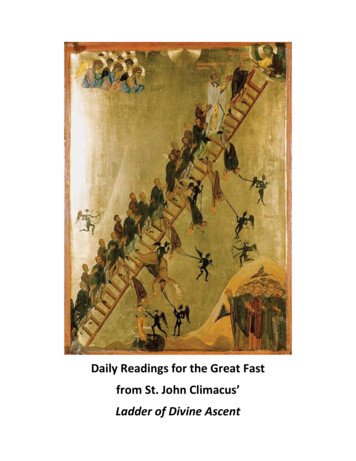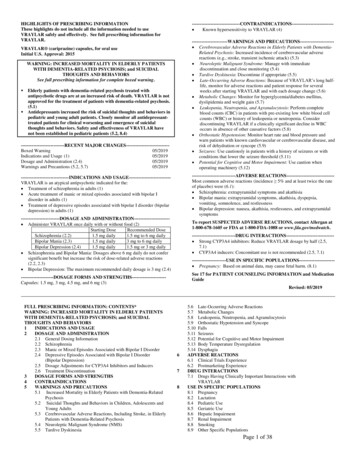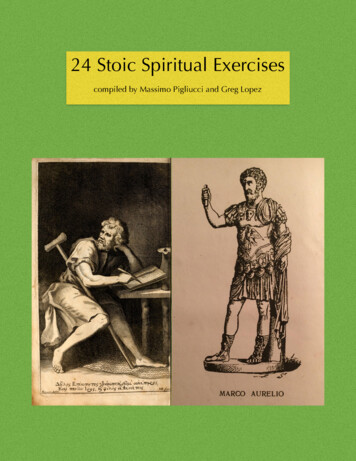
Transcription
The Daily Stoic Interviewsdailystoic.com1
The Daily Stoic InterviewsINTRODUCTION“Go straight to the seat of intelligence,” Marcus Aurelius told himself two thousandyears ago, “your own, the world’s, your neighbor’s.” What he meant by that was thatthe philosopher must avail themselves of the knowledge and wisdom of the world,including that which was already contained within them.One of the most most common literary forms in ancient Greece and Rome was thedialogue. These—mostly hypothetical—conversations between illustrious statesmen,between a philosopher and a fool, between a student and his teacher from antiquity fillthousands of pages and hundreds of books. Cicero, long a student and admirer of theStoics, would himself write many, including On the Orator, On Friendship, On Old Age,as well as On the Ends of Good and Evil, in which at one point Cicero would engage inan imaginary dialogue with Cato the Younger on Stoicism.It was only appropriate then, when we founded DailyStoic.com in 2016, that we woulduse this platform to conduct as many dialogues as we could with wise men and women,statesmen, leaders, athletes, authors and philosophers. Unlike Cicero’s dialogues, oursare real. We really did get to discuss philosophy with bestselling author of 48 Lawsof Power Robert Greene, Georgetown and Naval Academy professor Nancy Sherman,philosopher Alain de Botton, investor and entrepreneur Kevin Rose, SouthWest EnergyCEO Tewodros Ashenafi, the late political philosophy professor Peter Lawler, the NewYorker’s Elif Batuman, professor and martial artist Daniele Bolelli, The Power of Meaningauthor Emily Esfahani Smith, cognitive-behavioural psychotherapist Donald Robertson,NBC’s Sunday Night Football anchor Michele Tafoya and many others. Instead of waitinguntil they had left this world and guessing or approximating what they might have said,as Plato did with Socrates or Cicero with Cato, we were fortunate enough to actuallyask—to get them on record and on topic. Or rather, we got in person, over the phone orvia email, and ask them the kind of questions and get the kind of answers that containthe kind of timeless wisdom designed to last through the ages.Needless to say, we learned quite a bit. It was from Michele Tafoya, who likes to read apage of Stoic philosophy each morning, that we learned how to respond to the inherentunfairness of life.“Life is unfair. That is a fact. If life were fair, no child would ever die. If life werefair, everyone would look the same. If life were fair, cupcakes and potato chips woulddailystoic.com1
The Daily Stoic Interviewsbe good for you. Accepting that life is not fair is liberating. It reminds you that thereare some things with which you have to deal and accept. Why play the victim? Itdoesn’t get you anywhere. I don’t accept illogical unfairness — like being paid less thansomeone doing the same job I’m doing. But I do accept that there are people on TVwho are much prettier than I am. I accept that I have to exercise and diet to look theway I want. I accept that I have to freeze my tail off during some games while Al andCris sit in a warm booth with hot chocolate! These are things I signed up for.”It was author Emily Esfahani Smith who told us how to find awe and transcendence inthe busy modern world.“For transcendence, I make sure to regularly spend time in places that inspire awein me, like in nature or at the art museum. I’ve found that technology can be a realbarrier to both transcendence and belonging, so I’m trying to get some control over myaddiction to it. Instead of checking social media or the headlines before I go to bed, Itry to read a poem or listen to some music as I meditate. I don’t always succeed, but noone said trying to live a meaningful life is easy!”And from the late Peter Lawler we learned that one is never inwardly a slave.“The lesson of Epictetus is that the rational man is never inwardly a slave, no matterwhat his political and material circumstances happen to be. As the novels of thecontemporary Southern Stoic Tom Wolfe—often called “the novelist of manliness”—show, Epictetus rises in the Southern imagination as Stoicism gets democratized. InA Man In Full, Wolfe has a completely down-and-out character who finds innerfreedom by actually coming upon a copy of Epictetus’ writing, and he ends up knowingexactly what to do to preserve his dignity all by himself in a maximum security prison.And that novel ends, with a character on fire as a born-again Zeussian—or a Stoic.”Although all these interviews are available online—many of them emailed via the dailyemail we do at DailyStoic.com—it is in this volume that they have been collected, editedand arranged together for the first time. We knew that we had conducted a number ofinterviews in the first year and half of the site’s existence, but it was shocking to see themall laid out. Since July 2016, we interviewed over 40 people from 7 countries and askedthem close to 250 questions. Their answers would tally more than 100,000 words (andcounting since we are still publishing interviews and have many more to come).2dailystoic.com
The Daily Stoic InterviewsFor this volume, we have taken the very best interviews and collected them here for you.Contained within these pages are exercises and practices that you can incorporate inyour daily life like the one Emily suggested above. We asked many of our intervieweesfor their favorite quotes from the Stoics, which you can reflect, meditate and journal on,book recommendations, or simply learning about their personal journeys and how theydiscovered philosophy.dailystoic.com3
The Daily Stoic InterviewsTABLE OF CONTENTS51. Robert Greene2. Nancy Sherman103. David “DHH” Heinemeier Hansson174. Oliver Burkeman225. Michael Lombardi256. Mark Manson287. Michele Tafoya348. Donald Robertson389. Daniele Bolelli4710. Elif Batuman5111. Peter Lawler5612. Massimo Pigliucci6113. Alain de Botton6514. Derren Brown8115. Tewodros Ashenafi8516. Mark Ralkowski8817. William B. Irvine9818. James Altucher10019. Kevin Rose11120. Emily Esfahani Smith1144dailystoic.com
The Daily Stoic InterviewsAn Interview with the Master:Robert Greene on StoicismExcept for the Stoics themselves, no one has influenced me as a reader and writer morethan Robert Greene. Which is why I was nervous but excited to interview Robert aboutStoicism and this ancient philosophy has influenced his work over the years. It’s noteveryday that one gets the opportunity to interview their idol and mentor–about theirfavorite topic no less–so I did not take the idea lightly. In fact, I was originally reluctantto impose, but now, having done so, I am so glad that I did. I hope you are too.As you’ll see below, Robert Greene has been reading and studying Stoic philosophy forover 30 years. During our interview, he walked to his shelf and pulled down a dog-earedcopy of Seneca. He did the same for a copy of Marcus Aurelius, and could rememberthe very camping trip where he’d taken most of the notes that filled that couple. He evenpointed out what some of the shorthand in it meant—AF, for amor fati.For those of you who are not familiar with Robert’s work, you should be. His booksThe 48 Laws of Power and 33 Strategies of War are classics that have been read by worldleaders and military generals. His books The 50th Law and Mastery not only feature stoicphilosophy, they are meditations on some of the most essential values of life: fearlessness,workmanship, mastery (inner and external mastery). Combined, his five books havesold millions of copies and will deservedly adorn bookshelves for hundreds of years. Besure to follow Robert on Facebook, Twitter and Instagram or sign up for his email listfor news about his next book.In the meantime, enjoy this interview:***I remember many years ago in an interview you did for PowerSeductionandWar.com you were asked about the stoics—specifically, Marcus Aurelius–and you hadsaid you hadn’t studied them much for your books on power and war since theydidn’t have great reputations as generals or leaders. What made you decide to lookto the Stoics for your other books?dailystoic.com5
The Daily Stoic InterviewsWell, that’s weird to hear that quoted back to me but I guess it’s true. I didn’t readMarcus Aurelius until I wrote 48 Laws of Power, so I came to him a bit late. I was struckby his quote about the boxer who is struck in the face in the ring–he can’t complain, heunderstands that this is part of life and he must deal with it.I may have found the quotejust as I was finishing the book. It didn’t apply to 48 Laws or Art of Seduction, it wasn’tuntil 50th Law that the Stoics really fit for what I was writing. That’s when I startedmining them. The book that introduced me to the stoics was Letters from a Stoic. That’sthe title of the edition that Penguin put out and I have. Here, I am pulling it off myshelf now to look at it. I probably read this books for the first time when I was 23 or24. I loved it. I carried it with me everywhere. That book has been with me, along withMachiavelli and a few others, and seeped into my brain for a long time.My copy has all my weird notes in from when I was 23. It had a big impact on me. Ithink the reason is that when you’re at that age you’re kind of searching and looking forlike a father figure and the way the letters are written it’s kind of like a father giving youadvice–the way my father never would have been. The books that have had a big impacton me tend to seep through everything.The 50th Law was about dealing with fear and that was so relevant to the Stoics. Itallowed me to bring in Seneca and reintroduced me to Marcus who is probably myfavorite of the Stoics. I did use them a little for Mastery. I am using them a fair amountof my next book, The Laws of Human Nature.As someone who is very much into Zen Buddhism, Stoicism is probably the closestthing to it in the Western sense. What’s so nice about it is that it’s not only a hardcorephilosophy but it’s also quite poetic. It makes you contemplate the weirdness of life andthe sublimity of things. It’s just a beautiful philosophy. My long winded answer is is thatseeps into all your books–Seneca and Marcus Aurelius most of all.Is there a quote or passage you like best from the Stoics?I’ve always loved this quote from Marcus Aurelius:“Like seeing roasted meat and other dishes in front of you and suddenly realizing: Thisis a dead fish. A dead bird. A dead pig. Or that this noble vintage is grape juice, andthe purple robes are sheep wool dyed with shellfish blood. Or making love—something6dailystoic.com
The Daily Stoic Interviewsrubbing against your penis, a brief seizure and a little cloudy liquid. Perceptions likethat—latching onto things and piercing through them, so we see what they really are.That’s what we need to do all the time—all through our lives when things lay claimto our trust—to lay them bare and see how pointless they are, to strip away the legendthat encrusts them.”I’ve tried to bring that across in my writing. For instance, to deconstruct things like powerand seduction and to see the actual elements in play instead of the legends surroundingthem. So many people have this conception of power as being something that onlyinvolves world leaders, is some separate realm of human endeavor, when in fact peopleare constantly angling for power in the simplest things they do in life. I also wanted toaccomplish that in Mastery in chapter 4, See People as They Are. Ignore people’s words,the front they present and see what they are really up to. My new book is completelydevoted to this idea.Seneca was a wily power broker who tutored Nero. Do you think his role as aMachiavellian leader undermines his philosophy? Or do you like him for that?You should know that answer to that! That’s why I like Seneca. He’s flawed. He’s ahuman being. He tried to change the course of Roman history by turning Nero into aphilosopher king.I think it’s worth saying, we don’t know much about Nero or how bad he really was. Ifyou read different sources, you find that Seneca was a brilliant tutor and Nero had anexcellent education. Seneca loved money, that’s for sure. He accumulated a fortune. Hecould be quite Machiavellian in his handling of Nero, which I would never hold againsthim. But he most definitely lived according to his principles. His death was one of themost moving things in all of history. If anyone embodies stoicism it is Seneca in the waythat he died, the courage he displayed. Anyway, if you’re going to mess with power inthe world and try to change things you’re going to get your hands dirty.In The 50th Law, you talk about the concept of amor fati—a love of fate. Obviouslythis originated with Nietzsche but it’s a very Stoic idea. Why is that such an importantidea?dailystoic.com7
The Daily Stoic InterviewsI came upon that through Nietzsche. He was obsessed with those two words. Goingback some thirty years for me, when I read about this concept I just found it so exciting.It is linked with his concept of the eternal recurrence. Basically, this means that you liveyour life according to the principle that if you were to have to repeat the same actions asin the past, you would do them the same way. In other words, be at one with your fateand give your actions the weight of eternity. Stop wishing for something else to happen,for a different fate. That is to live a false life.Through Nietzsche, I discovered amor fati. I just fell in love with the concept becausethe power that you can have in life of accepting your fate is so immense that it’s almosthard to fathom. You feel that everything happens for a purpose, and that it is up to youto make this purpose something positive and active. It depends on how you see things,how you interpret this fate. It’s all what you discuss so well in The Obstacle is the Way.Amor fati is something I notice a lot more in Marcus Aurelius. I have the habit of putting“AF” in the margins whenever I feel there is something related to amor fati, and my verybeat up copy of the Meditations is full of “AFs”. It’s just that he expresses the idea in somany different ways without using those words.How do you use philosophy–whether it’s Stoicism or any other ancient way ofthinking—in the course of your life today?Philosophy used to be about helping people in their daily lives, overcoming fears ofdeath, finding the appropriate path to follow, how to deal with impossible people, howto maintain one’s dignity. Then in the 20th century it became so abstract and so divorcedfrom daily life that only a handful of graduate students care anymore about philosophy.The one thing that cannot be denied is that we all must die. Philosophy no longer dealswith that basic truth. It’s all about pseudo-intellectual problems. But that is what somuch of academic life is like these days.The Stoics and philosophers up to Nietzsche tried to simplify matters instead ofneedlessly complicate them. They are not trying to impress you with their flowery orlofty rhetoric, with the cleverness of their reasoning, but instead they try to help youlive your life. I take to their writings as if it were water in a desert. I mean many of theancient philosophers, not all of them.8dailystoic.com
The Daily Stoic InterviewsAs a simple example, I take Seneca’s advice to heart: thinking often of my mortality,actively imagining the end of my life, and how I will accept it. This is not morbid buta way to make a person appreciate every moment of life and not have such a wretchedfear of death that makes people refuse to think of it. That is a major impact Seneca hashad on my daily life and I would be a lot poorer without it.dailystoic.com9
The Daily Stoic InterviewsStoicism in the Military: An Interview withProfessor Nancy ShermanMany of history’s great military leaders have naturally gravitated towards Stoic philosophyand its ready prescriptions for resilience, courage and duty. Frederick the Great rodewith the Stoics in his saddlebags, George Washington put on a play about Cato at ValleyForge, and more recently General Mattis carried Marcus Aurelius’s Meditations with himon deployments. Both Cato and Marcus Aurelius saw war and civil war first hand.This is why we wanted to reach out to Professor Nancy Sherman, who is not only aprofessor of Stoicism but specifically an expert on Stoicism in the military, writing thebook Stoic Warriors: The Ancient Philosophy Behind the Military Mind. If you are not yetfamiliar with Professor Sherman, her credentials as a scholar are unparalleled. She is adistinguished University Professor and Professor of Philosophy at Georgetown Universityand holds a Ph.D. from Harvard University in philosophy, where she received Harvard’sGeorge Plympton Adam’s Prize for the most distinguished doctoral dissertation in thearea of history of philosophy. She is the author of several other books, including TheUntold War: Inside the Hearts, Minds, and Souls of our Soldiers.In our interview below we ask Professor Sherman about how and why she decided tofocus on the connection between Stoicism and the military, why the philosophy has adeep appeal in the military, her time with James Stockdale and much more! Enjoy thisinterview with Nancy Sherman, and you can stay up to date with her work by visitingher website, nancysherman.com.***You are well known in the Stoic community for your work Stoic Warriors: TheAncient Philosophy Behind the Military Mind. Can you tell us why you decided towrite the book and what brought you to philosophy?Stoic Warriors: The Ancient Philosophy Behind the Military Mind has its origins in my timeat the U.S. Naval Academy in the mid-nineties when I served as their first DistinguishedChair in Ethics. I was brought in at the height of a cheating scandal and was asked tohelp “morally remediate” the midshipmen. I was never quite sure what that term meant,but what followed was my developing an ethics curriculum for the Academy, some of10dailystoic.com
The Daily Stoic Interviewswhich is still in place. The reading that resonated most with midshipmen and officersalike was Epictetus’s Handbook. What I discovered was that the military communityknew the ethos of “sucking it up” better than most. In the face of war and long andugly deployments, the idea that one can fortify one’s self-sufficiency and happinessthrough discipline and mental (and physical) exercises really appealed to them. Theywere hungry for readings that could help them understand their own ways of standingup to loss and deprivation.I am an ancient philosopher by training and so I thought it would be really importantfor that community to tangle with the ancient texts, not just superficially, by reading alittle Epictetus or Marcus here and there, but by thinking about the blessings and cursesof being stoic. That’s the origin of Stoic Warriors. In writing the book, I came to thinkthat Seneca was a much underrated philosopher in the academic community. And partof my own “tangling” with texts led to my really appreciating his writing and his ownstruggles with being stoic and understanding its limitations.My own journey to philosophy began as an undergraduate through an eliminativeprocess. I came to college with this oversized question: What did it mean to be human?And I thought an elite school like Bryn Mawr, where I was headed, would be just theplace to find some answers. I thought anthropology might be the discipline that heldthe secrets. But intro. anthropology was a physical anthropology course—bones anddessicated artifacts; that wasn’t going to do it for me. So I turned to English. Andwhile I adored reading literature, the critical skills we honed had more to do withliterary style and analysis than the meaty questions themselves to do with living a good,human life. I then turned to psychology. We worked with lab rats in those days, and Inamed mine, “Absalom,” as I was fixated on Faulkner then. But Skinnererian behavioralpsych., and rewarding animals with food pellets when they pressed levers in order tocondition the response, wasn’t quite what I imagined as answering the big question.Finally, after a brief romance with political science and political philosophy, I fell intophilosophy. Aristotle is my real philosophical love, and he left a trail of questions inthe Nicomachean Ethics that the Stoics picked up, to do with control, agency, and luckand their role in happiness. I began to sort out some of those questions in my first andsecond books, Fabric of Character and Making a Necessity of Virtue. Stoic Warriors was away of deepening Aristotle’s worries by considering just how much control we have inour lives and what we lose when we push that desire for control too far. The books thatfollowed Stoic Warriors and forming a kind of trilogy, Untold War and Afterwar, werefurther ways of exploring the real (and sometimes tragic) collisions of good character,resilience, and luck in war and its aftermath.dailystoic.com11
The Daily Stoic InterviewsFrederick the Great rode with the Stoics in his saddlebags, George Washington puton a rendition of Cato at Valley Forge, today even General Mattis carries MarcusAurelius with him on deployments. Why is that you think Stoicism and soldieringhave such a deep connection?Stoicism has deep appeal to the military. You are sailor, say a midlevel officer on a ship;you’re headed for home after a long deployment in the Persian Gulf. You and your fiancehave set a wedding date set for August 1. But your ship gets turned around and you’reredeployed, heading back to the Persian Gulf for an unanticipated redeployment. Youhave to cancel the wedding and rescind all the invitations. You have no idea now whenyou’re going to get home and when and if you are going to get married. The example isa trivial one, but it points to the pervasive uncertainty of life as a military person. Hereis where Epictetus’s voice offers solace. “Some things are up to us and some are not .About the things that are not up to us, be ready to say, “You are nothing in relation tome.”The idea of letting go is part of the appeal of Stoicism to the military. Certainly the sailorI worked with who told me this story found consolation in remembering Epictetus.Being a good soldier, sailor, marine, wingman, depends on smarts, moral conscience(saying ‘no’ to unjust wars and unjust conduct), leadership, strategy and technical skills,resilience, and much much more. But it also depends on accepting that certain thingsare beyond one’s control and due to the fog of war, the overwhelming lethality of theenemy, the incompetence of leaders you depend on, sheer contingency, and more. Ashumans, especially in war, where the devastation is so awful, we often want to takeresponsibility, fill in the gaps of our limited agency and anguish about what we couldhave and should have done. That is the nature of what I call the moral guilt that comeswith “accident luck,” and the sense of strict liability it can bring on. The guilt canbe reasonable, understandable, yet still not track real culpability. Sometimes we aresomewhat responsible for bad things, but not entirely and we don’t quite know howmorally and psychologically to mitigate the feelings of guilt and shame. Being able todraw the line between your virtuous agency and what merely happens to you is a usefulskill. And it can be psychologically critical.Still, Stoic writing can at once be hyperbolic and nuanced. What you can’t control oughtto be a matter of indifference: “Be prepared to say that it is nothing to you.” But theStoics also teach that what we can’t fully control, we must still care about and “select,” in12dailystoic.com
The Daily Stoic Interviewstheir lingo, as “preferred indifferents” or “disselect” as “dispreffered indifferents.” We gofor positive goods, for health, friendship, love objects, and avoid negative ones, death,life threat, and so on, but without the clingy attachments or aversions that can derailour happiness. I, myself, am not sure we can both “select” and “disselect” those goodsand bads as the Stoics ask us to and yet stand toward them with the kind of equanimitythat the Stoics demand. And that’s not just because most of us aren’t sages. It’s becauseemotional attachments to those things we love requires real vulnerability. If you givethat up and armor yourself against loss, you give up the possibility for real love.The lesson here is from Cicero. He lost his beloved daughter Tullia in the winter of 45BCE in childbirth and retreated from Rome to the Tusculan hills to immerse himselfin Stoic self-help literature in order to find ways to cope with his profound grief. “Mysorrow is stronger than any consolation,” he writes to his friend Atticus. “I try all Iknow to bring my face if not my heart back to composure, if I can. While I do this Isometimes feel I am committing a sin, at others that I should be sinning if i failed to doit.” The Tusculan Disputations lays bare his struggle to find solace in Stoic tonics. Thefirst step is external, to control comportment, in a good Roman way. This, it seems, heis able to do. But to convince himself at a deeper level that he didn’t suffer real loss, thathis own happiness is not now marred, is something he cannot bring himself to accept.Tullia is not just a preferred indifferent. She is a genuine good and a genuine, nonfungible component of his happiness. What Cicero lays bare is an Aristotelian teachingthat stands at sharp odds with Stoic teachings. As Cicero puts it, in a voice critical of theStoics: “It is not within our power to forget or gloss over circumstances which we beliveto be evil, at the very moment they are piercing us. They tear at us, buffet us, goad us,scorch us, stifle us—and you tell us to forget them?” (T.D. 3.35)I think we need to read and reread Cicero as we read the Stoics. For he, and to somedegree Seneca, remind us routinely of the limits of Stoic aspirations.You’ve had the rare honor to interview James Stockdale, who is probably the mostwell-known of the modern Stoics and arguably tested it under some of the mostextreme circumstances. Can you tell us about what interviewing him was like?I interviewed Jim Stockdale several times, but the last time was near the end of his lifein his home in Coronado, California. Stockdale knew Epictetus’s Handbook by heart,and he could recite its lines seamlessly in his own James Cagney-like voice. When Ilistened to him, I came to think for a short while I was actually hearing Epictetus, ordailystoic.com13
The Daily Stoic Interviewsat least, some American re-incarnation of him! Jim Stockdale was part of a team thatincluded Sybil, his wife and co-author of their book, In Love and War. Stockdale’s releasefrom seven and a half years as a POW in the Hanoi Hilton had much to do with hertireless work in Washington, including a famous visit with President Nixon, on behalf ofthe POW’s and those missing in action in Vietnam. She was far from a quiet, demurewife. And she made it clear to me during my visit that day in Coronado that Stoicismwas not her cup of tea, even if it was her husband’s. Their attachment to each otherwas unmistakeable. Their remarkable correspondence and the uncanny way they buriedtheir secrets in those highly censored letters was a testament of their courageous love andsheer smarts as a couple that worked together in the most extreme adversity.Stockdale, you know, was not a converter. He told me repeatedly that while Stoicismwas his salvation, he didn’t preach it to others. In solitary confinement, the POW’swould tap out in code to those on the older side of the wall: “Are you ok?” He did thatonce and began, somehow, getting a bit preachy and Stoic. The responses from the otherside stopped. There was dead silence. His listener had stopped listening. He told me, heconcluded from thereon, more or less: They had their ducks lined up one way. I had myducks lined up another way. And that’s where we left it.That said, as senior officer, he was head of the chain of command in prison, and Stoicisminformed his command, both in terms of rules of governance within the chain and rulesof engagement with guards. The theme was clearly Epictetan: “We are the masters of ourfate,” which I describe at length in Stoic Warriors.Speaking of James Stockdale, the Stoic most closely associated with him is Epictetus.There’s that famous quote when his helicopter was shot in Vietnam, “I’m leaving theworld of technology and entering the world of Epictetus.” Yet we’ve found Epictetusis often the hardest to start with (and also had the least military experience). Whenyou taught at the Naval College, was there a specific Stoic you felt was the mostaccessible? That your students were most interested in?The midshipmen and officers at the Naval Academy, and I have to say, my Georgetownundergraduate students in general, find Epictetus very appealing. The epigrammaticstyle, the can-do philosophy, the sense of agency, positive thinking, and empowerment,all resonate. But I also routinely teach Seneca. And I think Seneca, and his corpusas a whole, is far more interesting and nuanced. Seneca struggles hard with sheddingtears and yet controlling them, with the different levels of emotional response—from14dailystoic.com
The Daily Stoic Interviewsphysiological arousal to full-fledged assented evaluations, to wanting to give up worldlygoods to being wed to them. He is honest in telling us that he is the Stoic doctor aswell as the Stoic patient “lying ill in the same hospital.” “Listen to me, therefore, as youwould if I were talking to myself.” He gives us permission to grieve. He is very much themoral progressor, and not a sage or saint. His epistles and essays are well worth readingand rereading.There is a sense in your book that Stoicism is in part a flawed philosophy, or at least,an incomplete one. Why do you think that is? What do you feel Stoicism is missingfor our modern life—and modern warriors?Stoicism has blessings and curses. If w
And that novel ends, with a character on fire as a born-again Zeussian—or a Stoic." Although all these interviews are available online—many of thememailed via the daily email we do at DailyStoic.com—it is in this volume that they have been collected, edited and arranged together for the first time. We knew that we had conducted a number of
